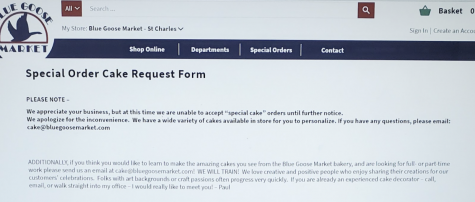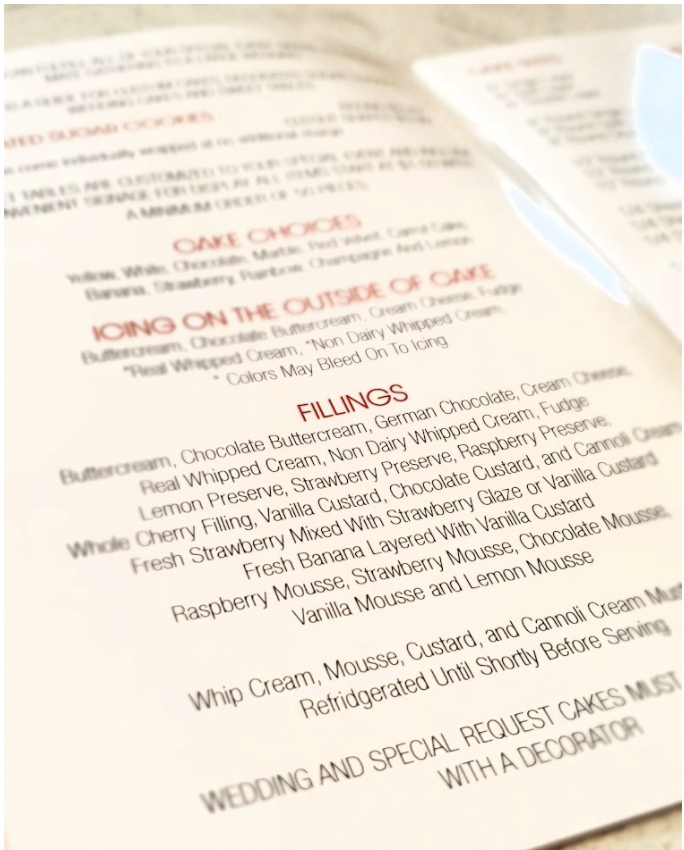Supply, staff, and food shortages take toll
Menu at the Mad Hatter Bakery in St. Charles, one business that has seen shortages affect offerings. Photo by Serena Thakkar.
November 17, 2021
Thanksgiving: A day to gather with loved ones, give thanks, and enjoy good food. However, with labor and supply shortages plaguing numerous sectors since the start of the global pandemic, Americans’ “good food” may look slightly different this year.
From the start of the food chain at turkey farms to the end of the journey in a supermarket, every step of the way comes with a unique set of obstacles that may alter what Thanksgiving looks like this year.
Kauffman Turkey Farms, an independent, family-owned farm in Waterman, IL, is the largest turkey farm in Illinois. Susan Kauffman, wife of owner Robert Kauffman, explained how throughout the pandemic they’ve had a decreased supply in a variety of necessities.
“Last year we had issues with gloves and things like that for workers because of the pandemic,” Kauffman explained. “This year we have had some labor shortages for dressing the turkeys. We usually hire about 80 people, however this year we are about five or six people short.”
Fortunately, since the farm does their own driving and raises their own corn, they are able to avoid a decrease in labor for transportation or grain-feed for their turkeys, obstacles many other farms are facing.
Along with turkey, baked goods are a staple Thanksgiving item for many. Opened on October 8th, Mad Batter Bakery & Confection located on Main Street in St. Charles is also experiencing the effects from the pressures put on supply chains.
Co-owner Amanda O’Connor emphasized the difficulty of obtaining raw materials. “The place we usually get our supplies from is experiencing a decrease in supply. We have to get our supplies from various other places, rather than buying everything from one place,” O’Connor said.
With cake fillings ranging from German chocolate to cannoli cream, along with a variety of pies and muffins, Thanksgiving essentials, Mad Batter’s wide selection of items amplifies the consequences they are experiencing.
East Senior Meghan Brophy works at Blue Goose Market. Brophy stated that the grocery store has encountered similar obstacles. “We have a labor shortage, we are really low on cake decorators. We are also out of a lot of stock,” Brophy said.
“Since we have such a short staff we can’t take things like cake or donut orders. If people want to place an order they have to go through the website and our manager must approve it to make sure the bakery can handle the order.”
Frequently referred to as “The Great Resignation,” the increasing number of workers quitting is a primary cause of supply shortages. According to TIME, 4.3 million Americans quit their job in August and roughly 25% of people 20 to 34 years of age were not a part of America’s workforce in September.
Burnout, lack of pay, and feeling held back are common causes to the record breaking job openings. Emma Grace Moon told TIME about her decision to quit her marketing job and no longer be held back by her agency.
“I felt like I could exceed my trajectory way faster if it was in my hands, rather than reporting every year, every month, with a quarterly check-in,” she stated. Moon’s salary is now triple the amount of her previous salary.
Unemployment rates in the service sector are also skyrocketing, as people can no longer sustain the poor treatment and low pay.
Ifeoma Ezimako, 23, told TIME how during her time in the hospitality industry and bartending she would regularly be asked to pull her mask down, so customers could see her face to decide how much to tip. After quitting, Ezimako is now acquiring a sociology degree while volunteering for One Fair Wage, an organization advocating for fair treatment for employees in the service industry.
Companies are attempting to combat the increasing unemployment rate by raising their minimum wage. According to Forbes, Amazon, Target, and Costco’s minimum wage is $15 an hour.
Although restaurants are also trying to increase their minimum wage, this often comes at the expense of low prices for customers. At the end of June 2021, Chipotle’s average wage was $15 an hour. However they have raised prices nearly 4% to make up for the lost profit.
Until The Great Resignation ends it will be difficult to put an end to the bottleneck that supply chains are currently experiencing. As Thanksgiving quickly approaches, be sure to secure your holiday essentials soon to avoid facing a plethora of empty shelves while scrambling to find crucial ingredients.




